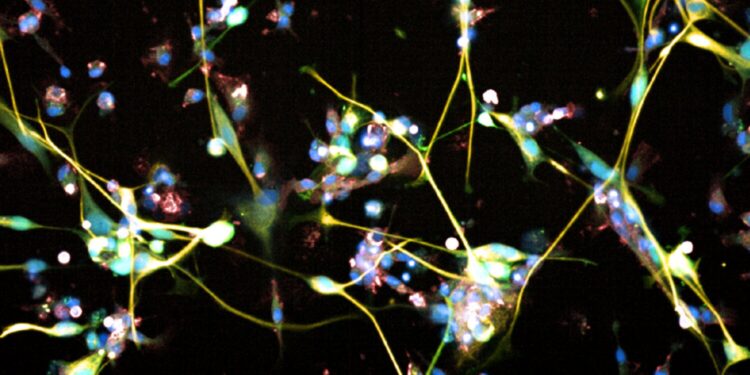Illustration of deadly brain tumor cells: glioblastoma. Credit: Sohyon Lee and Berend Snijeder / ETH Zurich
Glioblastoma is a particularly aggressive and currently incurable brain tumor. Oncologists can extend the life expectancy of patients through operations, radiotherapy, chemotherapy or surgical procedures. However, half of patients die within twelve months of diagnosis.
Finding effective drugs for brain tumors is difficult because many cancer drugs cannot cross the blood-brain barrier to reach the brain. This limits the choice of possible treatments. So neuro-oncologists have been looking for some time for better drugs that can reach the brain and eliminate the tumor.
Researchers led by Professor Berend Snijder of ETH Zurich have discovered a substance that effectively fights glioblastomas, at least in the laboratory: an antidepressant called vortioxetine. Scientists know that this inexpensive drug, already approved by organizations such as the FDA in the United States and Swissmedic, is able to cross the blood-brain barrier.
Sohyon Lee, Snijder’s postdoctoral fellow and lead author of the study, discovered the virus using pharmacoscopy, a special screening platform that researchers at ETH Zurich have developed over the past few years. The study results were published in the journal Natural medicine.
In this study, the ETH Zurich researchers worked closely with colleagues from different hospitals, in particular with the group of neurologists Michael Weller and Tobias Weiss from the University Hospital Zurich (USZ).
Testing hundreds of substances simultaneously
Using pharmacoscopy, the ETH Zurich researchers can simultaneously test hundreds of active substances on living cells from human cancer tissue. Their study focused primarily on neuroactive substances that cross the blood-brain barrier, such as antidepressants, Parkinson’s drugs and antipsychotics. In total, the research team tested up to 130 different substances on tumor tissue from 40 patients.
To determine which substances act on cancer cells, the researchers used imaging techniques and computer analyses. Until now, Snijder and his team had only used the pharmacoscopy platform to analyze blood cancers and derive treatment options from them. Glioblastomas are the first solid tumors that they have systematically studied using this method, with a view to using existing drugs for new purposes.
For the screening, Lee analyzed fresh cancer tissue from patients who had recently undergone surgery at the University Hospital Zurich. The ETH Zurich researchers then processed the tissue in the lab and analyzed it on the pharmacoscopy platform. Two days later, the researchers obtained results showing which agents were effective against cancer cells and which were not.
Antidepressants Surprisingly Effective
The results showed that some, but not all, of the antidepressants tested were surprisingly effective against tumor cells. These drugs were particularly effective when they rapidly triggered a signaling cascade, which is important for neuronal progenitor cells but also suppresses cell division. Vortioxetine was found to be the most effective antidepressant.
The ETH Zurich researchers also tested the effectiveness of more than a million substances against glioblastomas using a computer model. They found that the joint signaling cascade of neurons and cancer cells plays a decisive role and explains why some neuroactive drugs work and others do not.
In the final stage, researchers at the University Hospital Zurich tested vortioxetine on mice with glioblastoma. The drug also showed good efficacy in these trials, especially in combination with current standard treatment.
The research group from ETH Zurich and USZ is currently preparing two clinical trials. In the first, patients with glioblastoma will be treated with vortioxetine in addition to standard treatment (surgery, chemotherapy, radiotherapy). In the second, patients will receive a personalized selection of drugs, which the researchers will determine for each individual using the pharmacoscopy platform.
Widely available and inexpensive medication
“The advantage of vortioxetine is that it is safe and very inexpensive,” says Michael Weller, professor at the University Hospital Zurich, director of the Department of Neurology and co-author of the study. “Since the drug has already been approved, it does not need to go through a complex approval procedure and could soon complement the standard treatment of this deadly brain tumor.” He hopes that oncologists will soon be able to use it.
However, he warns patients and their relatives against the risk of obtaining vortioxetine themselves and taking it without medical supervision. “We do not yet know whether the drug is effective in humans or what dose is needed to fight the tumor, which is why clinical trials are needed. Self-medication would be an incalculable risk.”
Snijder also warns against rushing to use the antidepressant on glioblastomas, saying that “so far, its efficacy has only been proven in cell cultures and in mice.”
He nevertheless believes that this study has achieved an ideal result. “We started with this terrible tumor and found existing drugs to fight it. We show how and why they work, and we will soon be able to test them on patients.”
If vortioxetine proves effective, it will be the first time in decades that an active substance has been discovered to improve the treatment of glioblastoma.
More information:
High-throughput identification of reusable neuroactive drugs with potent anti-glioblastoma activity, Natural medicine (2024). DOI: 10.1038/s41591-024-03224-y
Quote:Antidepressant shows promise for treating brain tumors (2024, September 20) retrieved September 20, 2024 from
This document is subject to copyright. Apart from any fair dealing for the purpose of private study or research, no part may be reproduced without written permission. The content is provided for informational purposes only.



